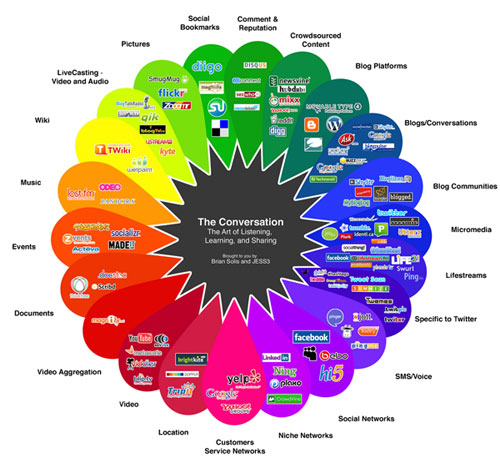Social media isn’t always the right tool for the job. Not every company needs a blog. YouTube worked for BlendTec, but it might not work for your company. And yet, there’s something to this. Over the last three days, I’ve spoken to four HUGE brands in America that are considering social media for one project or another, and there are many more out there working on how these tools might integrate into their business needs. Here’s a list of 50 ideas (in no particular order) to help move the conversation along.

- Add social bookmark links to your most important web pages and/or blog posts to improve sharing.
- Build blogs and teach conversational marketing and business relationship building techniques.
- For every video project purchased, ensure there’s an embeddable web version for improved sharing.
- Learn how tagging and other metadata improve your ability to search and measure the spread of information.
- Create informational podcasts about a product’s overall space, not just the product.
- Build community platforms around real communities of shared interest.
- Help companies participate in existing social networks, and build relationships on their turf.
- Check out Twitter as a way to show a company’s personality. (Don’t fabricate this).
- Couple your email newsletter content with additional website content on a blog for improved commenting.
- Build sentiment measurements, and listen to the larger web for how people are talking about your customer.
- Learn which bloggers might care about your customer. Learn how to measure their influence.
- Download the Social Media Press Release (pdf) and at least see what parts you want to take into your traditional press releases.
- Try out a short series of audio podcasts or video podcasts as content marketing and see how they draw.
- Build conversation maps for your customers using Technorati.com , Google Blogsearch, Summize, and FriendFeed.
- Experiment with Flickr and/or YouTube groups to build media for specific events. (Marvel Comics raised my impression of this with their Hulk statue Flickr group).
- Recommend that your staff start personal blogs on their personal interests, and learn first hand what it feels like, including managing comments, wanting promotion, etc.
- Map out an integrated project that incorporates a blog, use of commercial social networks, and a face-to-face event to build leads and drive awareness of a product.
- Start a community group on Facebook or Ning or MySpace or LinkedIn around the space where your customer does business. Example: what Jeremiah Owyang did for Hitachi Data Systems.
- Experiment with the value of live video like uStream.tv and Mogulus, or Qik on a cell phone.
- Attend a conference dealing with social media like New Media Expo, BlogWorld Expo, New Marketing Summit (disclosure: I run this one with CrossTech), and dozens and dozens more. (Email me for a calendar).
- Collect case studies of social media success. Tag them “socialmediacasestudy” in del.icio.us.
- Interview current social media practitioners. Look for bridges between your methods and theirs.
- Explore distribution. Can you reach more potential buyers/users/customers on social networks.
- Don’t forget early social sites like Yahoogroups and Craigslist. They still work remarkably well.
- Search Summize.com for as much data as you can find in Twitter on your product, your competitors, your space.
- Practice delivering quality content on your blogs, such that customers feel educated / equipped / informed.
- Consider the value of hiring a community manager. Could this role improve customer service? Improve customer retention? Promote through word of mouth?
- Turn your blog into a mobile blog site with Mofuse. Free.
- Learn what other free tools might work for community building, like MyBlogLog.
- Ensure you offer the basics on your site, like an email alternative to an RSS subscription. In fact, the more ways you can spread and distribute your content, the better.
- Investigate whether your product sells better by recommendation versus education, and use either wikis and widgets to help recommend, or videos and podcasts for education.
- Make WebsiteGrader.com your first stop for understanding the technical quality of a website.
- Make Compete.com your next stop for understanding a site’s traffic. Then, mash it against competitors’ sites.
- Learn how not to ask for 40 pieces of demographic data when giving something away for free. Instead, collect little bits over time. Gently.
- Remember that the people on social networks are all people, have likely been there a while, might know each other, and know that you’re new. Tread gently into new territories. Don’t NOT go. Just go gently.
- Help customers and prospects connect with you simply on your various networks. Consider a Lijit Wijit or other aggregator widget.
- Voting mechanisms like those used on Digg.com show your customers you care about which information is useful to them.
- Track your inbound links and when they come from blogs, be sure to comment on a few posts and build a relationship with the blogger.
- Find a bunch of bloggers and podcasters whose work you admire, and ask them for opinions on your social media projects. See if you can give them a free sneak peek at something, or some other “you’re special” reward for their time and effort (if it’s material, ask them to disclose it).
- Learn all you can about how NOT to pitch bloggers. Excellent resource: Susan Getgood.
- Try out shooting video interviews and video press releases and other bits of video to build more personable relationships. Don’t throw out text, but try adding video.
- Explore several viewpoints about social media marketing.
- Women are adding lots of value to social media. Get to know the ones making a difference. (And check out BlogHer as an event to explore).
- Experiment with different lengths and forms of video. Is entertaining and funny but brief better than longer but more informative? Don’t stop with one attempt. And try more than one hosting platform to test out features.
- Work with practitioners and media makers to see how they can use their skills to solve your problems. Don’t be afraid to set up pilot programs, instead of diving in head first.
- People power social media. Learn to believe in the value of people. Sounds hippie, but it’s the key.
- Spread good ideas far. Reblog them. Bookmark them. Vote them up at social sites. Be a good citizen.
- Don’t be afraid to fail. Be ready to apologize. Admit when you’ve made a mistake.
- Re-examine who in the organization might benefit from your social media efforts. Help equip them to learn from your project.
- Use the same tools you’re trying out externally for internal uses, if that makes sense, and learn about how this technology empowers your business collaboration, too.
Source: ChrisBrogan.com

